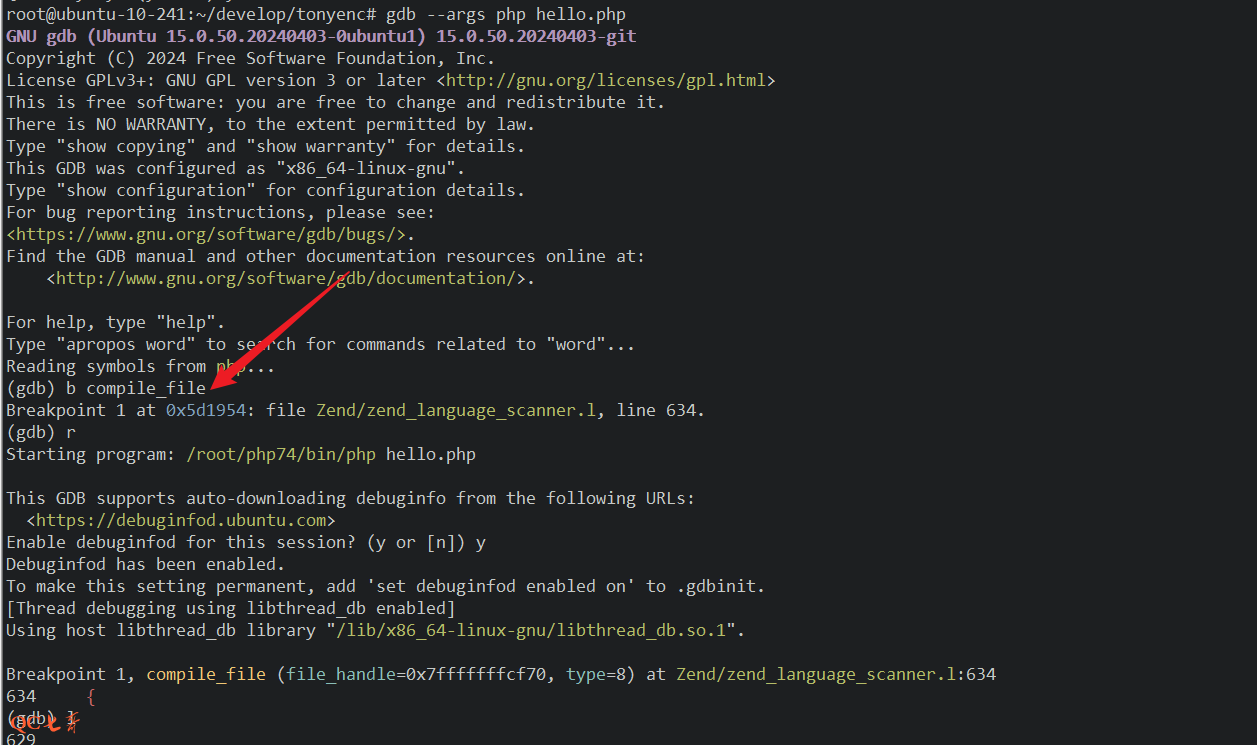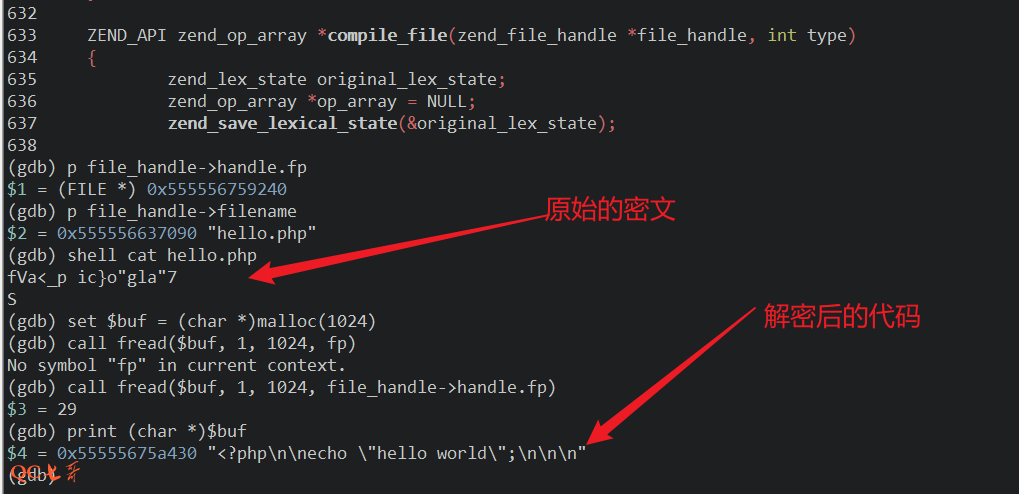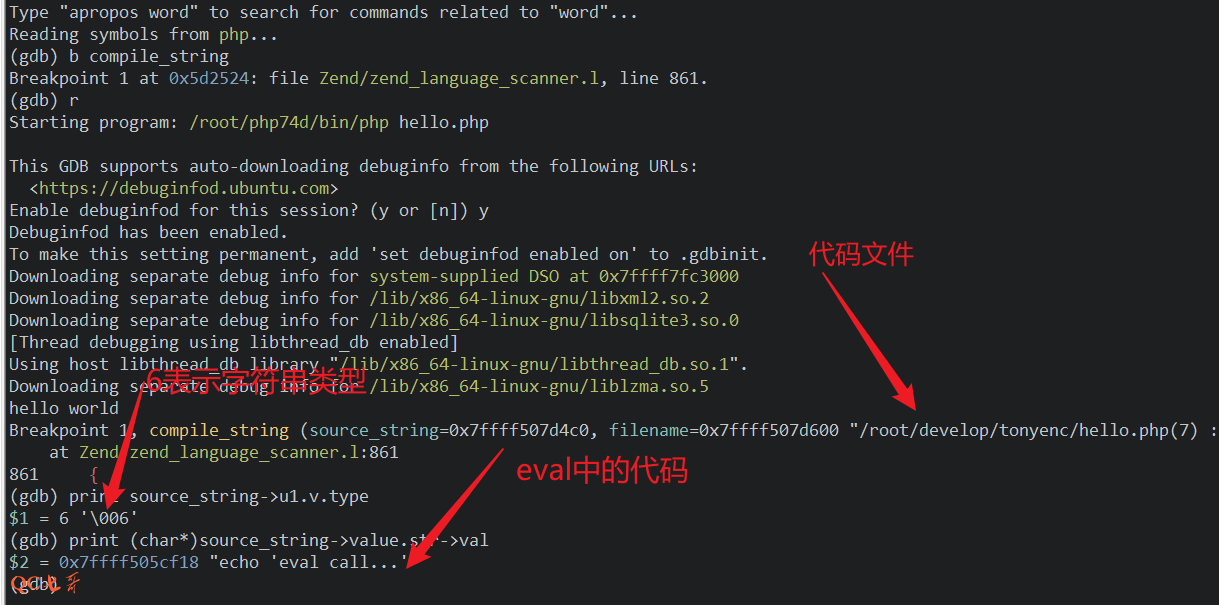前言
这里是对 php 扩展加密的一个入门学习,参考了原作者的开源实现 https://github.com/lihancong/tonyenc
该项目仅仅几百行代码,实现了 php 扩展加密的基本逻辑,通过该模块可以快速熟悉 php 基于扩展加密的整个处理流程
组件构建
本地的 php 环境是 7.4, 本地调试环境构建可以参考 这里,拉取 tonyenc 项目到本地进行编译的时候提示错误
In file included from /root/develop/tonyenc/tonyenc.c:30:
/root/develop/tonyenc/core.h: In function ‘cgi_compile_file’:
/root/develop/tonyenc/core.h:86:30: error: ‘ZEND_HANDLE_FD’ undeclared (first use in this function); did you mean ‘ZEND_HANDLE_FP’?
86 | if (file_handle->type == ZEND_HANDLE_FD) close(file_handle->handle.fd);
| ^~~~~~~~~~~~~~
| ZEND_HANDLE_FP
/root/develop/tonyenc/core.h:86:30: note: each undeclared identifier is reported only once for each function it appears in
/root/develop/tonyenc/core.h:86:72: error: ‘union <anonymous>’ has no member named ‘fd’; did you mean ‘fp’?
86 | if (file_handle->type == ZEND_HANDLE_FD) close(file_handle->handle.fd);
| ^~
因为 ZEND_HANDLE_FD 在 7.4 中已经被移除了,修改为如下对 ZEND_HANDLE_STREAM 的处理
root@ubuntu-10-241:~/develop/tonyenc# git diff
diff --git a/core.h b/core.h
index accb22c..1adbd97 100644
--- a/core.h
+++ b/core.h
@@ -83,7 +83,8 @@ zend_op_array *cgi_compile_file(zend_file_handle *file_handle, int type)
goto final;
if (file_handle->type == ZEND_HANDLE_FP) fclose(file_handle->handle.fp);
- if (file_handle->type == ZEND_HANDLE_FD) close(file_handle->handle.fd);
+ //if (file_handle->type == ZEND_HANDLE_FD) close(file_handle->handle.fd);
+ if (file_handle->type == ZEND_HANDLE_STREAM && file_handle->handle.stream.handle) php_stream_close(file_handle->handle.stream.handle);
#ifdef PHP_WIN32
file_handle->handle.fp = res;
编译后 make install 后将 tonyenc.so 库文件安装到 php 的 extensions 目录下,还需要修改 php.ini 文件增加 extension=tonyenc.so
加密与解密
代码的加解密函数在 core.h 文件中,完整代码如下,这个加密逻辑比较简单,使用了对称密钥加解密
1、只处理数据中的奇数下标
2、对每个待加密字节,先用一个由 tonyenc_key 派生出来的动态密钥 t 进行 XOR,然后再 NOT
3、加密后的数据直接写回原数组
void tonyenc_encode(char *data, size_t len)
{
size_t i, p = 0;
for (i = 0; i < len; ++i) {
if (i & 1) {
p += tonyenc_key[p] + i;
p %= sizeof(tonyenc_key);
u_char t = tonyenc_key[p];
data[i] = ~(data[i] ^ t);
}
}
}
void tonyenc_decode(char *data, size_t len)
{
size_t i, p = 0;
for (i = 0; i < len; ++i) {
if (i & 1) {
p += tonyenc_key[p] + i;
p %= sizeof(tonyenc_key);
u_char t = tonyenc_key[p];
data[i] = ~data[i] ^ t;
}
}
}
整个加密密钥是写在 core.h 文件中的,使用上也可以将密钥提取出来,保存到文件中或者部署到网络中,实现密钥随时替换
基于这种方式的加解密的密钥必须为同一个
待加密文件 hello.php 的代码如下,使用 php tonyenc.php hello.php 对代码进行加密,代码加密后被回写到 hello.php 中
<?php
echo "hello world";

使用 php hello.php 执行加密后的代码,输出 hello world(我本地编译的 php 是调试版本,还输出了额外的调试信息)

组件原理
组件的初始化代码如下,初始化的时候劫持了 php 代码的编译过程,将 zend_compile_file 替换为自定义的 cgi_compile_file 函数
PHP_MINIT_FUNCTION(tonyenc)
{
/* If you have INI entries, uncomment these lines
REGISTER_INI_ENTRIES();
*/
old_compile_file = zend_compile_file;
zend_compile_file = cgi_compile_file;
return SUCCESS;
}
/* }}} */
在 cgi_compile_file 函数内部,进行了 magic header 的判断是否经过 tonyenc 加密,未加密的交还原来的 zend_compile_file 进行处理
if (data_len >= sizeof(tonyenc_header)) {
char *t = emalloc(sizeof(tonyenc_header));
size_t read_cnt = fread(t, sizeof(tonyenc_header), 1, fp);
if (memcmp(t, tonyenc_header, sizeof(tonyenc_header))) {
efree(t);
fclose(fp);
goto final;
}
efree(t);
} else {
fclose(fp);
goto final;
}
加密的代码经过 tonyenc_ext_fopen 进行处理,在这里对代码进行解密,再将解密结果写入到临时文件中,最后交还给 zend_compile_file
tonyenc_decode(p_data, data_len);
......
*res = tmpfile();
if (*res == NULL) {
php_error_docref(NULL, E_CORE_ERROR, "tonyenc: Failed to create temp file, may be too many open files.\n");
efree(p_data);
return -1;
}
if (fwrite(p_data, data_len, 1, *res) != 1) {
php_error_docref(NULL, E_CORE_ERROR, "tonyenc: Failed to write temp file.\n");
efree(p_data);
fclose(*res);
return -2;
}
rewind(*res);
逆向实现
那解密思路就很清楚了,就是通过 hook 编译 php 代码的函数(zend_compile_file、zend_compile_string等)
这也是这类 php 扩展加密的常规解密思路,当然商业上成熟的 php 加密方案会更复杂,这里只是基本的使用
可以修改 php 的代码,增加 print 将这里的文件内容全部打印出来,也可以调试 php ,在这里挂上断点,将代码抓取出来
又或者使用通用组件(github也有一些开源的),hook 这里的 zend_compile_file 函数,将代码输出到文件中
使用通用组件 hook 该编译函数的话,就会出现有多个组件都 hook 了该编译函数,执行顺序就需要保证
假设有 A、B、C 三个扩展,按 A、B、C 的顺序先后加载,它们都 hook 了 zend_compile_file,代码如下
A_orig = zend_compile_file;
zend_compile_file = A_hook;
B_orig = zend_compile_file; // 此时是 A_hook
zend_compile_file = B_hook;
C_orig = zend_compile_file; // 此时是 B_hook
zend_compile_file = C_hook;
那么最终的调用就变成了 C_hook -> B_hook -> A_hook -> compile_file
也就是说要保证你的 hook 在解密后被调用,你的组件要被先加载,影响组件加载顺序的最简单的就是 php.ini 中的配置
pph 对组件都加载顺序是按 php.ini 文件中的 extension 顺序来处理的,因此只要将通用组件写在加密组件前就可以
这里使用 gdb 调试的方式打印出 php 的原始代码,gdb --args php hello.php 运行脚本
b compile_file 挂上断点,这个函数已经是在解密之后的 php 逻辑中了,然后 r 运行停在断点位置

这里的 file_handle->handle.fp 就是解密后临时文件的句柄,这个必须是没问题的,不然 compile_file 就没法执行了
file_handle->filename 还是原来的文件名,可以 shell cat hello.php 查看原始文件的内容,可以看到是加密的
这时候源代码已经被解密了,解密后的代码就在 fp 指向的这个临时文件中
通过将 fp 的文件内容读取到一个 buf 缓冲中,然后将其全部打印出来,就可以看到全部的源代码了
set $buf = (char *)malloc(1024)
call fread($buf, 1, 1024, file_handle->handle.fp)
print (char *)$buf

修改php代码逆向
compile_file 函数在 Zend/zend_language_scanner.l 文件中进行定义的,zend_language_scanner.c 是从该 l 文件生成的
因此修改的时候需要修改这个 l 文件,增加两个函数实现 extract_filename,write_zend_file_to_tmp 将解密后的文件写入 /tmp 目录
compile_file 函数增加一个 write_zend_file_to_tmp 调用,通过环境变量 PHP_DEBUG 进行控制是否进行源码的 dump 出
在 PHP_DEBUG 等于 1 的时候,将 php 源码 dump 出到 /tmp 目录下,并直接退出
static const char *extract_filename(const char *full_path) {
if (!full_path) return "unnamed_file";
const char *last_slash = strrchr(full_path, '/');
const char *last_backslash = strrchr(full_path, '\\');
const char *filename = full_path;
if (last_slash && (!last_backslash || last_slash > last_backslash)) {
filename = last_slash + 1;
} else if (last_backslash) {
filename = last_backslash + 1;
}
return filename && *filename ? filename : "unnamed_file";
}
int write_zend_file_to_tmp(zend_file_handle *zfh, const char *output_path) {
FILE *output_fp = NULL;
size_t bytes_read = 0;
size_t bytes_written = 0;
char buffer[4096];
if (!zfh) {
fprintf(stderr, "Invalid zend_file_handle\n");
return -1;
}
output_fp = fopen(output_path, "wb");
if (!output_fp) {
fprintf(stderr, "Failed to open output file: %s\n", output_path);
return -1;
}
switch (zfh->type) {
case ZEND_HANDLE_FP:
if (zfh->handle.fp) {
if (zfh->buf && zfh->len > 0) {
bytes_written = fwrite(zfh->buf, 1, zfh->len, output_fp);
if (bytes_written != zfh->len) {
fclose(output_fp);
return -1;
}
}
while ((bytes_read = fread(buffer, 1, sizeof(buffer), zfh->handle.fp)) > 0) {
bytes_written = fwrite(buffer, 1, bytes_read, output_fp);
if (bytes_written != bytes_read) {
fclose(output_fp);
return -1;
}
}
}
break;
case ZEND_HANDLE_STREAM:
if (zfh->buf && zfh->len > 0) {
bytes_written = fwrite(zfh->buf, 1, zfh->len, output_fp);
if (bytes_written != zfh->len) {
fclose(output_fp);
return -1;
}
}
break;
default:
fprintf(stderr, "Unknown handle type\n");
fclose(output_fp);
return -1;
}
fclose(output_fp);
return 0;
}
static int log_compile_filename(const char* msg) {
FILE *fp = fopen("/tmp/log_compile_file.log", "a");
if (!fp) {
fprintf(stderr, "Failed to open log_compile_file\n");
return -1;
}
time_t rawtime;
struct tm *timeinfo;
char timestamp[20];
time(&rawtime);
timeinfo = localtime(&rawtime);
strftime(timestamp, sizeof(timestamp), "%Y-%m-%d %H:%M:%S", timeinfo);
int size = fprintf(fp, "[%s] %s\n", timestamp, msg);
if (size < 0) {
fprintf(stderr, "Failed to write log_compile_file\n");
fclose(fp);
return -1;
}
fclose(fp);
return 0;
}
ZEND_API zend_op_array *compile_file(zend_file_handle *file_handle, int type)
{
const char* value = getenv("PHP_DEBUG_FILE");
if (value != NULL && strcmp(value, "1") == 0) {
char output_path[256];
const char *filename = extract_filename(file_handle->filename);
snprintf(output_path, sizeof(output_path), "/tmp/%s", filename);
fprintf(stdout, "php debug for output:%s\n", output_path);
log_compile_filename(file_handle->filename);
write_zend_file_to_tmp(file_handle, output_path);
}
......
}
修改后重新编译 php 代码生成执行文件,在没启用环境变量之前,使用 php tonyenc.php hello.php 加密源代码

启用 PHP_DEBUG 环境变量之后,再使用 php hello.php 执行将源码 dump 出到 /tmp 目录下

在 php 中直接运行文件时会直接调用到 compile_file 这里,通过 eval 调用的代码将会运行到 compile_string 这里
同样可以在 compile_string 入口增加输出,将 eval 执行的代码打印出来
static void dump_source_to_file(zval *source_string, char *filename) {
if (!source_string || Z_TYPE_P(source_string) != IS_STRING) {
return;
}
zend_string *str = source_string->value.str;
char *content = ZSTR_VAL(str);
size_t length = ZSTR_LEN(str);
const char *basename = strrchr(filename, '/');
if (basename) {
basename++;
} else {
basename = filename;
}
char *end = strstr(basename, "(");
if (!end) {
end = basename + strlen(basename);
}
size_t name_len = end - basename;
char clean_filename[256];
if (name_len >= sizeof(clean_filename)) {
name_len = sizeof(clean_filename) - 1;
}
strncpy(clean_filename, basename, name_len);
clean_filename[name_len] = '\0';
char filepath[256];
snprintf(filepath, sizeof(filepath), "/tmp/%s", clean_filename);
FILE *fp = fopen(filepath, "w");
if (fp) {
fwrite(content, 1, length, fp);
fclose(fp);
} else {
fprintf(stderr, "Failed to open file: %s\n", filepath);
}
}
zend_op_array *compile_string(zval *source_string, char *filename)
{
const char* value = getenv("PHP_DEBUG_STRING");
if (value != NULL && strcmp(value, "1") == 0) {
dump_source_to_file(source_string, filename);
}
...
}
使用 gdb 调试的话,如下为运行代码,gdb 启动调试 gdb --args php hello.php,在 compile_string 函数下断点
然后使用 print source_string->u1.v.type 打印类型,6 表示字符类型,再将其打印出来 print (char*)source_string->value.str->val
<?php
echo "hello world";
eval("echo 'eval call...';");
